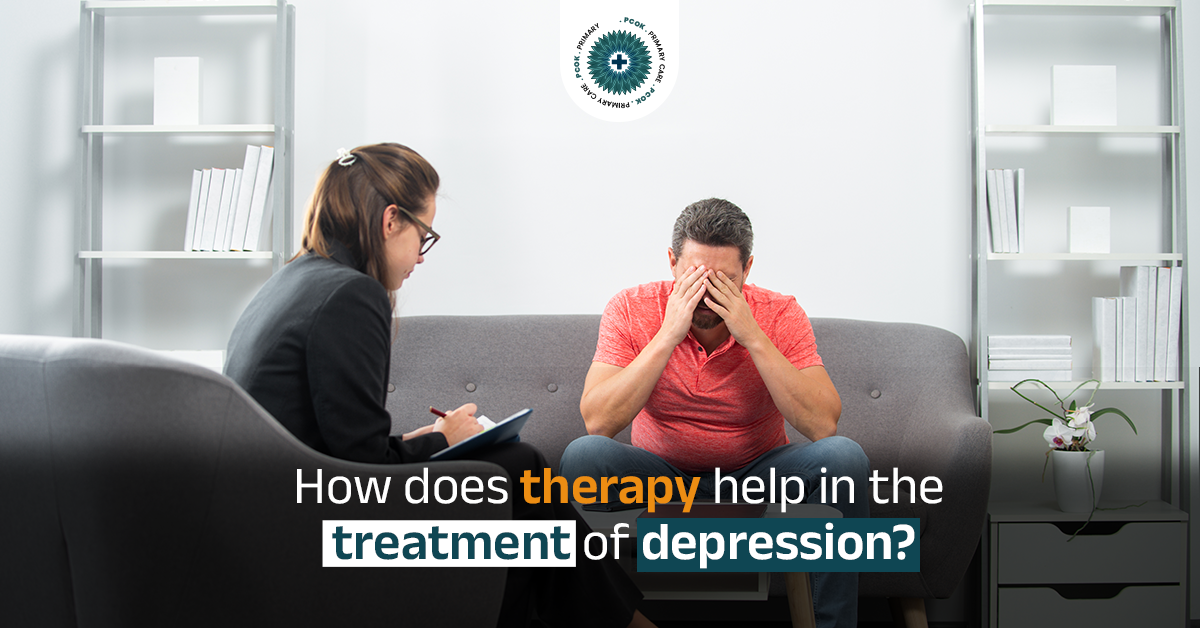Depression is an intricate and frequently overwhelming psychological problem that is encountered by masses of individuals globally.
Even though drugs can be truly helpful in controlling the symptoms, therapy still remains a crucial necessity in order for an individual to gain long-term relief, and regaining a sense of control over their life.
Exactly, how does therapy help in the treatment of depression?
One of the things that we will discuss in this blog is the effectiveness of therapy for depression.
Also, we will talk about different treatment models which imply, and the benefits of therapy for depression.
Let’s get right into it.
Depression and Its Effects
The thing is depression is beyond feeling sad and unhappy.
It is a medical disorder that can prevent you from everyday activities, from being able to form relationships, and may also affect your general well-being.
Symptoms can vary from persistently feeling hopeless and weary to difficulty in concent
Depression may escalate if not handled well and thus, that would lead to a poor quality of life.
The therapeutic treatments for depression are intended to unveil these symptoms and prompt individuals to reveal the triggering causes before they can impart the skills of self-coping mechanisms for improving mental health.
How Does Therapy Help in the Treatment of Depression?
Therapy is a means of creating a safe and encouraging environment free from judgment and criticism where people can express their thoughts and feelings.
Here’s how therapy contributes to treating depression with therapy:
-
Identification of Underlying Issues
One of the main benefits of therapy for depression is that it brings out the real reasons for emotional difficulties.
Whether that be past trauma, living with ongoing stress, or dealing with unresolved grief, therapy is a type of tool that enables the exploration of such issues.
-
Provision of Coping Skills
Therapists help clients have tools capable of managing specific negative symptoms that accompany depression.
Ways like changing thoughts to positive ones, mindfulness practices, and relaxation exercises can all be helpful for people to feel in control again.
-
Shifting the Focus from Negative to Positive Thoughts
Cognitive Behavioural Therapy (CBT) is being largely used and recognized as an efficient modality for depression therapy treatment.
This treatment addresses both the negative patterns by removing them and promoting more productive ones to replace them.
-
Building Emotional Resilience
Therapy is the means through which people learn to navigate their emotions and thereby develop personal resilience.
Gradually, the severity and frequency of these episodes go down with time.
-
Providing Assistance and Validation
Therapists help clients be in a space where they have the right to speak and feel understood.
The association between the two, patient, and psychologist, will contribute to the necessary confidence for the patient and thus further promote the patient’s restoration.
Types of Therapy Modalities for Depression
Diverse kinds of therapy for depression serve individual needs in positive ways. Here are some therapy modalities for depression with the highest efficiency measured:
-
Cognitive Behavioral Therapy (CBT)
CBT is a goal-driven, constructive way to help narrow down and adjust to unwelcome negative thoughts.
Studies have demonstrated that CBT is most beneficial in mild to moderate cases of depression.
-
Interpersonal Therapy (IPT)
IPT is where a person talks about the interpersonal dynamics that affect mental health.
It is beneficial to those people who are facing interpersonal conflicts or social isolation, and that is the cause of their depression.
-
Psychodynamic Therapy
This unique approach to therapy involves the therapists coming with an approach quite different.
They subconsciously work with people and also the unresolved anxiety and fear from the past, it helps individuals to recognize the multifactorial nature of their thoughts and behaviors.
-
Dialectical Behavior Therapy (DBT)
At first, DBT was applied solely to people diagnosed with borderline personalities, but now, the technique is being used also by individuals suffering from depressive disorders.
It introduces mindfulness and emotional regulation skills.
-
Group Therapy
Group therapy is a bonding of people who share the same health problem or issue and thus act as a unit of support for each other.
Does Therapy Help Depression? Evidence Says Yes
The effectiveness of therapy for depression is backed by extensive research.
A study has proven the effectiveness of psychological therapies including CBT and IPT in combating depression.
Moreover, receiving therapy in addition to taking medications is usually better than taking the medications alone.
Benefits of Therapy for Depression
- Healthy Relationships – Through therapy, clients learn various skills that enable effective communication and relationships which ultimately leads to greater productivity in social, family, and professional spheres.
- High Self-Esteem Levels – Therapy also diminishes and helps people get rid of their false ideas which will enable them to increase their self-esteem and self-worth.
- Long-term Solution – In contrast, counseling deals with the issues and gives them the tools and strategies to improve their lives.
Next Steps
You are not alone in the fight, as there are people who care and are ready to help.
How does therapy help in the treatment of depression? There are individual therapy sessions that address depression or other possible mental health issues.
Our therapists at Primary Care of Kansas are specialized in healing depression and managing other mental health problems.
Receive a consultation with our experts, where they evaluate the therapeutic treatments for depression best suited to your needs.
FAQs
How does therapy help people with depression?
Therapy gives people much sought-after tools to regulate and handle symptoms, exposes them to the causes of depression, and provides emotional support in the long run.
How does therapy help in the treatment?
Therapy is something that can also help in building resilience so that in the future, there will not be depressive episodes.
What therapy is most successful in treating depression?
Cognitive behavioral therapy helps a lot.
What is the best treatment for depression?
Eeffective treatment consists of a combination of medicine and therapy.
Both of these can be actually customized to patient needs.


No comment